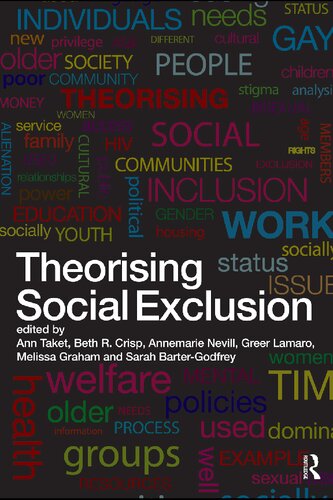

Most ebook files are in PDF format, so you can easily read them using various software such as Foxit Reader or directly on the Google Chrome browser.
Some ebook files are released by publishers in other formats such as .awz, .mobi, .epub, .fb2, etc. You may need to install specific software to read these formats on mobile/PC, such as Calibre.
Please read the tutorial at this link. https://ebooknice.com/page/post?id=faq
We offer FREE conversion to the popular formats you request; however, this may take some time. Therefore, right after payment, please email us, and we will try to provide the service as quickly as possible.
For some exceptional file formats or broken links (if any), please refrain from opening any disputes. Instead, email us first, and we will try to assist within a maximum of 6 hours.
EbookNice Team

Status:
Available4.5
28 reviewsSocial exclusion attempts to make sense out of multiple deprivations and inequities experienced by people and areas, and the reinforcing effects of reduced participation, consumption, mobility, access, integration, influence and recognition. This book works from a multidisciplinary approach across health, welfare, and education, linking practice and research in order to improve our understanding of the processes that foster exclusion and how to prevent it.
Theorising Social Exclusion first reviews and reflects upon existing thinking, literature and research into social exclusion and social connectedness, outlining an integrated theory of social exclusion across dimensions of social action and along pathways of social processes. A series of commissioned chapters then develop and illustrate the theory by addressing the machinery of social exclusion and connectedness, the pathways towards exclusion and, finally, experiences of exclusion and connection.
This innovative book takes a truly multidisciplinary approach and focuses on the often-neglected cultural and social aspects of exclusion. It will be of interest to academics in fields of public health, health promotion, social work, community development, disability studies, occupational therapy, policy, sociology, politics, and environment.